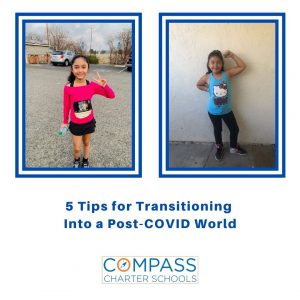
Transition is difficult for everyone, but the pandemic has hit many of us like nothing ever has before, especially for our scholars. The changes to our lives happened rapidly and abruptly. And these types of life adjustments often come with a wide range of emotions, experiences, and behaviors. Some of us deal with transitions well, while for others, it can be downright scary and overwhelming!
For many of us, this has been a long series of “survival modes,” staying strong, gathering resources, and attempting to function normally when we feel the exact opposite. Some of us are used to our new routines and “new normal.” And for many, this whole pandemic has been an uphill task in combating social isolation. This has been a time of learning how to live (or re-live) with family, partners, or roommates, which is not always easy. We may have struggled to find a distraction-free space at home that is conducive to effective and productive work.
One thing is for sure; it is critical to be extra compassionate and patient with ourselves during all of this. We may be struggling with a new wide array of emotions, including anxiety, frustration, fatigue, sadness, anger, grief, or others. Some may be moving relatively smoothly through this adjustment process and are finding comfort returning to this new normal. In contrast, others may have grown accustomed to solitude and are overwhelmed with progressing back to normal.
Here are 5 tips for transitioning back to this new normal, post-Covid and the vaccines:
Proceed with caution.
Make sure to ease back into new activities; no matter how excited you are, you are navigating through a transition. Psychologically and physically, you may be more exhausted than usual by the types of situations you’ve gone without for many months. Do not rush into too many things at once; pace yourself, as you have become adept to a lack of structure and socialization. Work in some time to process and adjust to re-entering society, and be honest with yourself about when you are moving too quickly.
Leave expectations behind.
Many people have expectations about what their life should look like after returning from isolation. Leave those behind. Maybe you are vaccinated but still, feel unready to go back into an office or a social setting. Maybe after talking about how much you missed your friends, you now are not feeling particularly excited to gather with them in person. Perhaps you couldn’t wait for a post-vaccine vacation, but now you are apprehensive about traveling. Do not put added pressure on yourself; be open to working through a wide array of emotions!
Set your personal boundaries.
As we transition back into this new normal after the pandemic, everyone will have a different version of what this will look like. Do not be afraid to say no to things that you are not yet comfortable with doing. Please do not compare yourself to others and where they are at in this post-pandemic stage. Remember that there is no right or wrong reaction when it comes to emotions. Listen and speak respectfully in negotiations with friends and family about what is reasonable for gatherings, celebrations, and trips. When things get heated, pause first before speaking and try to observe what’s going on within your body. Allow yourself time to counteract your agitation and calm yourself down before escalating things further.
 Increase your self-care.
Increase your self-care.
Remember that just because you cannot wait to get back out and socialize, engage in new activities, and attend events does not mean that your mind and body will automatically be able to keep up! Pay attention to your mental health; get enough sleep, downtime, healthy eating, etc. Any disruption to what you’ve grown accustomed to can take a toll on the body and mind, even if it’s a welcomed disruption. Prioritize similar self-care techniques that were important during the initial stress of lockdown.
Be gentle with yourself.
As much as you may be dreaming about all the exciting places you will visit and things you will do in a post-COVID world, remember the lines between before, during, or after are anything but clear-cut. The return to something that resembles normal life will likely take far, far longer than we ever realized. Transition is a gradual process, with different milestones, levels of risk, and timelines for various activities with different people. Most importantly, be patient with yourself, embrace the transition, and do not force yourself to feel a certain way before you are ready. Above all, remember that this situation is both uncertain and temporary!
My hope in writing this blog is that you realize that you are not alone in going through this adjustment process. Remember that your Compass Counselors are just a phone call or email away. I hope that during this chaos, you have learned something new about yourself and have been able to find moments of peace.


 Increase your self-care.
Increase your self-care.